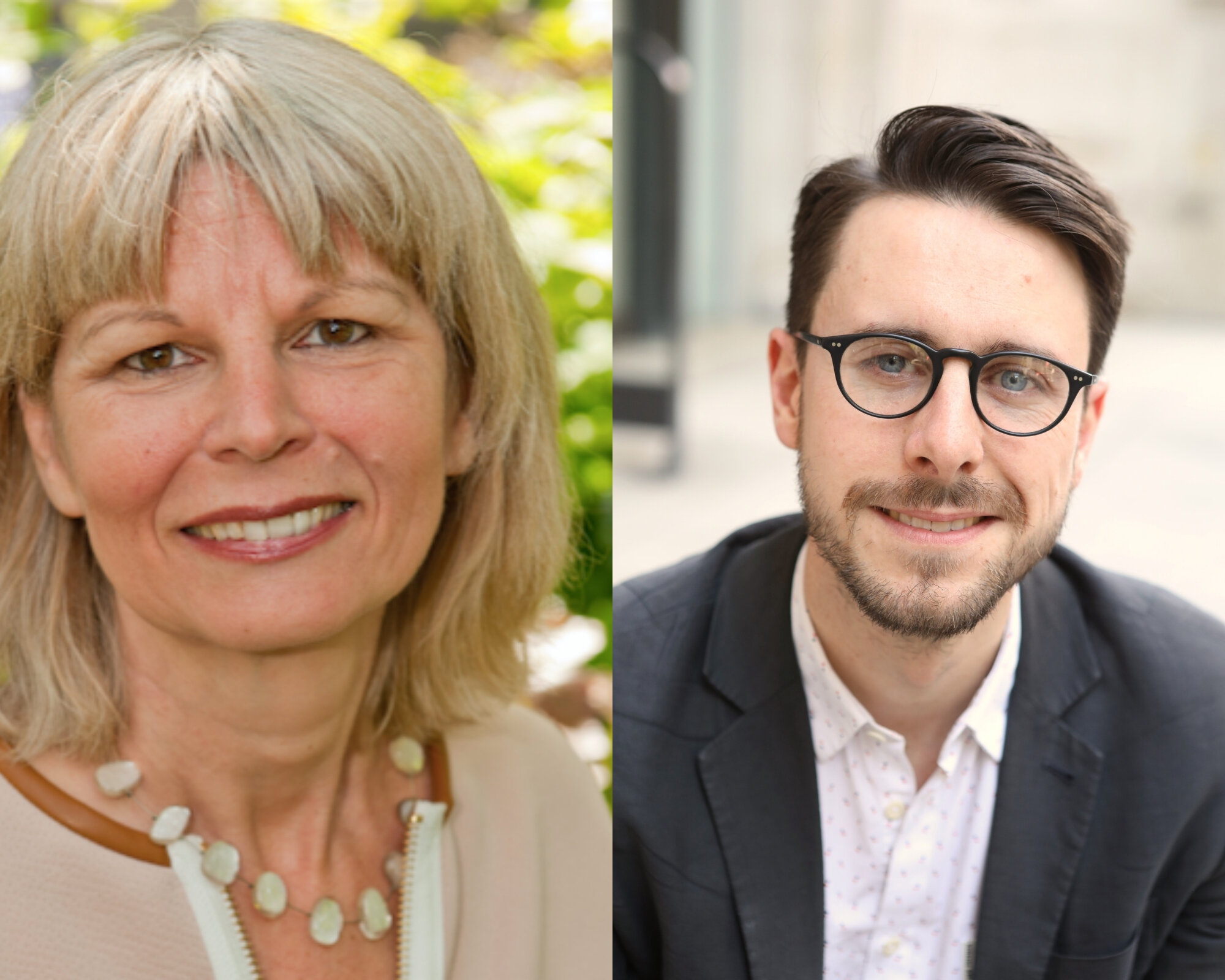
Events
All times are CET and the approximate duration of the events is 1.5 hours.
If you would like to receive the Zoom links for the individual events, please subscribe to our newsletter.The salon of 18th century Europe, as is well known, was founded on deep exclusions, including class, ethnicity, and gender. Today’s public spheres are similarly based on deep exclusions, at a time of increasing inequality, forced migrations, chronic political and environmental crises, and intensified debate about the continuation of colonialism’s legacy. The European Media Salon aims to interrogate those exclusions.
Our first series of talks for 2022 will therefore ask leading scholars to debate a series of key topics relevant to understanding challenging those exclusions.
Communicative AI, Human-Machine Communication and the Automation of media and Communications: Taking a societal view
Artificial Companions like voice-based agents, social robots, bots on Twitter and other platforms, systems of automated generation of journalistic content are increasingly spreading. These technological developments are seemingly associated with a major change in the media environment and the ways in which we communicate, challenging our understanding of the nature, actors and borders of communication. Yet, to media and communication scholars, this shift is similar to the development of the Internet towards the commercialized Web 2.0 and associated platforms. At the same time, the public, but also media and communication research, has a persistently limited view of this automation of communication. There is little discussion and research on what consequences this has for societal communication and human agency as a whole. Instead, the discourse is either dominated by techno-utopian views, or comparatively “narrowly” focused on the interaction of humans and machines as happening in a vacuum, while the research is often instrumental on the “improvement” and “implementation” of such systems. In this event of the European Media Salon we want to discuss how critical and sociologically informed research on communicative AI, human-machine-communication and the automation of communication should look like, which sees these as part of societal communication.
The conversation will be about questions of fascination with the automation of communication, about the object of automation, and about implications for the discussion of artificial intelligence.
Discussants:
Leopoldina Fortunati (https://en.wikipedia.org/wiki/Leopoldina_Fortunati)
David Gunkel (https://www.gunkelweb.com)
Decolonizing knowledge production: Tensions in modern social theory and public sphere
The consolidation of modern social theory coincided with the height of European empires and global war between them. By the mid-twentieth century, many European countries were confronted by anti-colonial movements and challenges to their global dominance. However, these challenges have had little impact on the organization of the social sciences. This conversation will focus on tensions and fictions around the concept of ‘decolonization’ in contemporary knowledge production and public sphere. What does it mean to ‘decolonise’ a social sciences curriculum in which colonialism is unrecognised? What does the stretching out of the concept entail for those who are still subjected to multiple states of coloniality? What would it look like to acknowledge and resist these multiple levels of coloniality?
AI and the Frontlines of the Digital Limit Situation
ABSTRACT
The pandemic has laid bare our over-reliance on communication. Media technologies are everyday lifelines offering care and solace. AI technologies have simultaneously colonized the very horizon of the future, as they seem to offer salvation from humanity’s many problems. But are they really good for the planet? This conversation between Benedetta Brevini and Amanda Lagerkvist will tackle these urgent issues head on: As we stand on the brink as a civilization – due to a series of interrelated crises including climate change – how can we as communication scholars make sense of our new digital existence, of being human, and of human responsibility? And what brave moves do we need to make in our field, in order to move onto the frontlines of the digital limit situation?
Dr Benedetta Brevini is Associate Professor of Communication at the University of Sydney. Before joining the academy she worked as journalist in Milan, New York and London for CNBC and RAI. She writes on The Guardian’s Comment is Free and contributes to a number of print and web publications including Index of Censorship, OpenDemocracy and the Conversation. She is the author of Public Service Broadcasting online (2013) and editor of Beyond Wikileaks (2013). Her latest volumes are Carbon Capitalism and Communication: Confronting Climate Crisis (PalgraveMacmillan, 2017), Climate Change and the Media (Peter Lang, 2018), and Amazon: Understanding a Global Communication Giant (Routledge, 2020). Is AI good for the planet (Polity, 2021) is her newest work.
Dr. Amanda Lagerkvist is Professor of Media and Communication Studies in the Department of Informatics and Media at Uppsala University. As Wallenberg Academy Fellow (2014-2018) she founded the field of existential media studies. In her work she has explored among other things digital memories, death online and automation as lived experience. She is the PI of the WASP-HS project “BioMe: Existential Challenges and Ethical Imperatives of Biometric Artificial Intelligence in Everyday Lifeworlds.” Her latest monograph, Existential Media: A Media Theory of the Limit Situation (OUP) will be published in Spring 2022.
The interrelated politics of forced migration, media & data: memory, surveillance, and extraction
Attention for the role of digital media in processes of migration has grown considerably in the last years. The focus has remained in particular on the representation of migration. In the wake of the long summer of migration in Europe in 2015, news reporters for example commonly focused on smartphone carrying and selfie-taking refugees. In the last years, across the world, migration is increasingly securitized. Data driven solutions are embraced by governments and humanitarian agencies for efficient forms of border control, surveillance and migration management. In this salon, Karina Horsti, Henri Mainsah, and Koen Leurs address how digital technologies and datafication are impacting upon forced migration. How do those on the move experience digital technologies? How do they curate their own stories on their own portable devices and social media profiles? How do they circulate their own memories and testimonies? How do transnational families use mobile technology to manage uncertainties of disappearance, death and mourning? How do monitored forced migrants themselves experience digital enforcement and surveillance capitalism? How do they imagine that the images and other data extracted from their cellphones can be used against them, their families, or communities? How can we understand and map the socio-technical landscape that shapes the deployment of forms of extractive surveillance capitalism?
Dr. Karina Horsti is Senior Lecturer at the University of Jyväskylä. Since 2000, she has developed a multidisciplinary profile in transnational migration research by successfully completing research on cultural diversity policies, nationalist populism, and mediated representations of refugees and asylum seekers.
Dr. Koen Leurs is an assistant professor in Gender and Postcolonial Studies at the Graduate Gender Program, Department of Media and Culture, Utrecht University, the Netherlands. Leurs interests include media and diaspora; social media and urban youth culture, identity and the city; infrastructures, data and digital archives. His next book is titled Digital Migration Studies, forthcoming with Sage.
Dr Henri Mainsah is a senior researcher at Consumption Research Norway (SIFO), Oslo Metropolitan University, and was previously Associate Professor at the Oslo School of Architecture and Design. His research interests include urban technologies, social media, smart living, place-making practices, creative research methods, participatory design, and new literacies.
Ukraine, the global crisis and public spheres: An open discussion
The world is not the same after February 24, 2022. Since the first hours of the Russian invasion of Ukraine, we are facing no less than a crisis on a global scale. This crisis - comprising security, politics, economics, ecology and, above all, human lives and mentality - now dominates the public spheres and people's minds. The European Media Salon recognizes the urgent need to discuss the current events and discourses. Therefore we have postponed our planned event on the theme of decolonization, and will hold an open discussion focussing on the current crisis and its relations with the mediated public spheres. We invite everyone to join us and raise and discuss topics of concern regarding this shared crisis, the media, and our societies.
Doing gender and sexuality on social media: participatory culture and/or a more inclusive public sphere?
The public and academic discourse about gender performance online, proclaims how public spheres online are more and more inclusive towards diverse manifestations of gender and sexuality. Is online public sphere more inclusive indeed? Which are the tensions between doing gender online and being subjected to neoliberal constructions of sexuality and gender at the same time? We attempt to unpack a range of discourses about gendered performance in social media, persisting gender inequalities in the context of participatory cultures online, that problematize the arguments about the inclusivity and openness of the online public sphere.
Professor Liza Tsaliki, National and Kapodistrian University of Athens, EL
Dr. Cosimo Marco Scarcelli, Assistant Professor, University of Padova, IT
Dr. Despina Chronaki, Adjunct Lecturer, Aristotle University of Thessaloniki, EL
European research policy for a transforming media landscape
The media landscapes across Europe (and elsewhere) are undergoing thorough structural transformations related to, among other things, ownership, datafication, ethics, and user patterns. What type of research policy is needed for tackling these transformations? How is research best organised and funded in a transnational environments that includes, but also extends, the EU? These are among the questions brought up in this dialogue between two of Europe’s most renowned scholars, who both have extensive experience from policy fora nationally and internationally.
Where is the public sphere going?
The platformization of the public sphere, with its numerous contradictions, has brought to the fore the fragile balance between freedom of expression and democracy. How public is the digital public sphere? Is regulation the only viable answer to the current crisis of democratic institutions and the public sphere? ultimately, is the very notion of the public sphere helpful to understand the current changes? or, rather, is it a taken for granted but outdated concept?
The future of platform power
What is the centre of gravity in the accumulation of power in platform ecosystems? Global platform companies are not only central forces in data distribution and accumulation, but also control the infrastructures on which their platforms operate. What are the technological, economic, and (geo-)political aspects of their governing power? And what are potential mechanisms for European counter power? In this European Media Salon, we will discuss the various options for European platform politics.

The salon opens its doors
If we want to understand how our society is currently changing with the increasing importance of digital media, data infrastructures and the automation of communication, probably nothing is more important than a joint critical discussion about this. And that is what the European Media Salon is meant to serve: In the tradition of the European salon as a meeting for open, intellectual exchange, it will be about discussion, partly online, partly in face-to-face meetings. At its opening, its initiators will discuss with Leopoldina Fortunati and all interested guests how such an exchange should best be organised.
The Initiators.
PAST EVENTS








